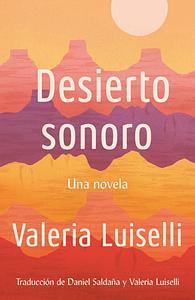You need to sign in or sign up before continuing.
Take a photo of a barcode or cover
I have a low tolerance for authors who write in the voice of child narrators, so that impaired my enjoyment of this book, as did the fact that the first 1/3 went much too slowly. That being said, I think the author did a great job of executing on her goal, which was to draw parallels between the vulnerability of children travelling alone, and to help us empathize with the terrifying journey of immigrant children crossing the U.S.-Mexico border alone. She also raised interesting questions about what it means to record factual information, and the way that adding information to our historical archive illuminates what gets left out. I still felt the book was a slog to get through, and I kept having to force myself to return to it, hence the 2-star rating.
This was excellent and. Avery different book than I expected in all the good ways. A novel that feels as real as non fiction.
Bold, experimental, often but not uniformly excellent, Lost Children Archive timely but not necessarily timeless. Lost Children archive is a mix of novel, memoir, non-fiction essay and collage, documenting a family road-trip to the Southwest, a husband and wife who document soundscapes, a wife who works on issues involving migrant children, a husband preoccupied with the Apaches and Geronimo, and their two children watching--and worrying--about their marriage. Told in short bursts with reference to real and fictional books divided by lists of the contents of the boxes they packed, including some photos and the like, Lost Children Archive defies genre. It is mostly plotless but the road trip gives it a structure. And it works well with multiple voices--I started out reading it but switched to audible and liked the way it used sound effects, different narrators, including Valeria Luiselli for the first person narrator.
The structure, however, did not make it a page turner and I sometimes felt bogged down in the repetitiveness of the relationship between the parents, his interest in the Apaches, and--I am mortified to admit--even the experiences of the migrant children. But other times I was blown away and fascinated. And all of it felt extremely timely, which is, of course, a virtue and vice.
Overall the book reinforced my enthusiasm for Luiselli. I was a big fan of [b:The Story of My Teeth|24796231|The Story of My Teeth|Valeria Luiselli|https://images.gr-assets.com/books/1429098006s/24796231.jpg|27680292] which was quirky, bizarre, story about an auctioneer of what he claims are famous people's teeth. Her [b:Tell Me How It Ends: An Essay in Forty Questions|33608721|Tell Me How It Ends An Essay in Forty Questions|Valeria Luiselli|https://images.gr-assets.com/books/1497428713s/33608721.jpg|54428382] was a spectacular non-fiction account of her experience as a volunteer translator in immigration proceedings--one that is short and direct enough that I would put it on the mandatory list. Lost Children Archive would only be on the recommended list.
The structure, however, did not make it a page turner and I sometimes felt bogged down in the repetitiveness of the relationship between the parents, his interest in the Apaches, and--I am mortified to admit--even the experiences of the migrant children. But other times I was blown away and fascinated. And all of it felt extremely timely, which is, of course, a virtue and vice.
Overall the book reinforced my enthusiasm for Luiselli. I was a big fan of [b:The Story of My Teeth|24796231|The Story of My Teeth|Valeria Luiselli|https://images.gr-assets.com/books/1429098006s/24796231.jpg|27680292] which was quirky, bizarre, story about an auctioneer of what he claims are famous people's teeth. Her [b:Tell Me How It Ends: An Essay in Forty Questions|33608721|Tell Me How It Ends An Essay in Forty Questions|Valeria Luiselli|https://images.gr-assets.com/books/1497428713s/33608721.jpg|54428382] was a spectacular non-fiction account of her experience as a volunteer translator in immigration proceedings--one that is short and direct enough that I would put it on the mandatory list. Lost Children Archive would only be on the recommended list.
Read this for book club and it was a very interesting read to say the least. Great for discussion about identity and interpreting what family means.
This is a quiet novel about a couple that is slowly parting ways and how their relationship affects their work and their children. Both parents are sound documentarists who spend their time recording the sounds around them. The technical look at this career and its implications were fascinating.
The book doesn't really have a plot and it's definitely filled with lots of character development and description of settings and sounds. If you're looking for a forward-moving book, this is not the book for you.
I loved the first section of the book while the wife/mother was narrating her life and her family's journey. Near the end of the book, the novel switched to the son's perspective and it felt like I was starting over as I heard his version of events.
The book doesn't really have a plot and it's definitely filled with lots of character development and description of settings and sounds. If you're looking for a forward-moving book, this is not the book for you.
I loved the first section of the book while the wife/mother was narrating her life and her family's journey. Near the end of the book, the novel switched to the son's perspective and it felt like I was starting over as I heard his version of events.
What a book! Wow! This tale of a family that slowly separating is so personable and heart wrenching at times. It really tackles the deportation issue head on. The author has poetic and sentimental touch. This novel is thought provoking, plotted masterfully. I give this a 4/5.
This book is something else. I'm almost at a loss for words in terms of what to say about it.
The first 2/3 are very good, but are slow and benign in comparison to the last 1/3 (when the narration shifts). That is not to say that the first 2/3 are boring at all, it's just that the pace picks up and it gets *tense*. Without spoiling anything, I actually had to flip to the end of the book to know what was going to happen because there was a moment when I couldn't stand the anxiety.
The author does really interesting and sophisticated (meta) with texts and a lot what she alludes to was lost on me because I'm not familiar with some of the specific texts, but she has a brief explanation at the end that is helpful. The structure of the novel around the concept of an archive and the infusion of sounds and listening was also unique and I enjoyed inhabiting a story that was not just a different world because of the story but also from the scaffolding around it.
The first 2/3 are very good, but are slow and benign in comparison to the last 1/3 (when the narration shifts). That is not to say that the first 2/3 are boring at all, it's just that the pace picks up and it gets *tense*. Without spoiling anything, I actually had to flip to the end of the book to know what was going to happen because there was a moment when I couldn't stand the anxiety.
The author does really interesting and sophisticated (meta) with texts and a lot what she alludes to was lost on me because I'm not familiar with some of the specific texts, but she has a brief explanation at the end that is helpful. The structure of the novel around the concept of an archive and the infusion of sounds and listening was also unique and I enjoyed inhabiting a story that was not just a different world because of the story but also from the scaffolding around it.
Luisella is a Mexican writer who lives in the US. She has been preoccupied with the stories of asylum-seeking children for several years. While the story of separated migrant families have dominated our news for the last year, my sense is that this novel is also referring to those unaccompanied children who have been arriving here for a number of years.
Two parents and their young son and daughter set out to drive from New York to the Southwest. The parents and the children are never named. The mother is a sound artist, and she is compelled by the stories of the US-Mexico border, particularly children who are lost. The images and language of the author are exquisite. The narration by the writer was spellbinding, but segments narrated by a young boy were almost jarring.
Two parents and their young son and daughter set out to drive from New York to the Southwest. The parents and the children are never named. The mother is a sound artist, and she is compelled by the stories of the US-Mexico border, particularly children who are lost. The images and language of the author are exquisite. The narration by the writer was spellbinding, but segments narrated by a young boy were almost jarring.
Generally I just do not do child-in-peril stories, but Valeria Luiselli often pushes me past what I believe to be true about myself. I had to sit quietly many times when I was reading this book. I have a five-year-old child named Memphis, and was not expecting to encounter another 5-year-old Memphis here. My child is safe. My child is fed. My child is in my house, with me, not separated. The emotional resonance was intense.
A lot of parenting is about being this vessel for the memories of our children's childhoods that they won't remember - to be their storytellers, remember their best knock knock jokes and favorite foods - but in this book, the parents are occupied recording the memories of New York, or the Apaches, or the Lost Children, and so the big brother finds himself in that role. It was clever for Luiselli to hand that role to the brother who already seemed so precocious, which seemed intensified so by this sort of self-imposed burden. I know a lot of people couldn't accept that character as an authentic child, but I have known (and been) the sort of serious child who makes maps and gets lost, and his voice seemed familiar to me.
I also listened to the audio book and I thought it was a brilliant format for this particular novel, with the emphasis on recorded sounds, and how sounds can be lost when ears stop hearing them, if they aren't recorded. I thought a lot about the stories and lives of those lost children, which are also lost when they aren't recorded.
Of course it's impossible to read this book without thinking about the current political landscape for immigrants and refugees in the United States. It is timely, and I hope some of the people who read it can see immigrants and refugees in a different light for having heard these stories, sounds, and elegies. I also read it as a natural evolution in Luiselli's development as a writer - the magical realism from The Story of My Teeth collides with the subject matter of Tell Me How It Ends. And I loved the way she referred to the "rescue distance" we discussed in Fever Dream, and then she took it further. It seemed like this book was in conversation with so many other things - It made me so curious about what references I was missing! Altogether, this book was a gripping read for me. It was well-constructed and had a lot to say, but it said it with a combination of grace and grit that I found irresistible. I will think about this book for a long time.
A lot of parenting is about being this vessel for the memories of our children's childhoods that they won't remember - to be their storytellers, remember their best knock knock jokes and favorite foods - but in this book, the parents are occupied recording the memories of New York, or the Apaches, or the Lost Children, and so the big brother finds himself in that role. It was clever for Luiselli to hand that role to the brother who already seemed so precocious, which seemed intensified so by this sort of self-imposed burden. I know a lot of people couldn't accept that character as an authentic child, but I have known (and been) the sort of serious child who makes maps and gets lost, and his voice seemed familiar to me.
I also listened to the audio book and I thought it was a brilliant format for this particular novel, with the emphasis on recorded sounds, and how sounds can be lost when ears stop hearing them, if they aren't recorded. I thought a lot about the stories and lives of those lost children, which are also lost when they aren't recorded.
Of course it's impossible to read this book without thinking about the current political landscape for immigrants and refugees in the United States. It is timely, and I hope some of the people who read it can see immigrants and refugees in a different light for having heard these stories, sounds, and elegies. I also read it as a natural evolution in Luiselli's development as a writer - the magical realism from The Story of My Teeth collides with the subject matter of Tell Me How It Ends. And I loved the way she referred to the "rescue distance" we discussed in Fever Dream, and then she took it further. It seemed like this book was in conversation with so many other things - It made me so curious about what references I was missing! Altogether, this book was a gripping read for me. It was well-constructed and had a lot to say, but it said it with a combination of grace and grit that I found irresistible. I will think about this book for a long time.









